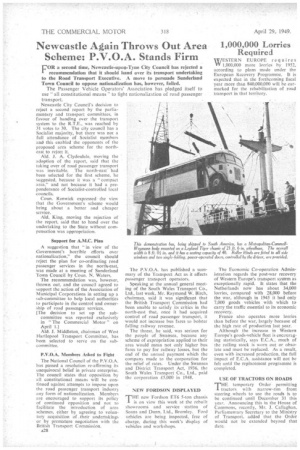Newcastle Again Throws Out Area Scheme: P.V.O.A. Stands Firm
Page 4

If you've noticed an error in this article please click here to report it so we can fix it.
FOR a second time, Newcastle-upon-Tyne City Council has rejected a recommendation that it should hand over its transport undertaking to the Road Transport Executive. A move to persuade Sunderland
Town Council to oppose nationalization has, however, failed.
The Passenger Vehicle Operators' Association has pledged itself to use "all constitutional means" to light nationalization of road passenger transport.
Newcastle City Council's decision to reject a second report by the parliamentary and transport committees, in favour of handing over the transport system to the R.T.E., was reached by 31 votes to 30. The city council has a Socialist majority, but there was not a full attendance of Socialist members and this enabled' the opponents of the proposed area scheme for the northeast to reject it.
Aid, J. A. Clydesdale. moving the adoption of the report, said that the taking over of road passenger transport was inevitable. The north-east r had been selected for the first scheme, he suggested, because it was a "compact area," and not because it had a preponderance of Socialist-controlled local councils.
Coun. Renwick expressed the view that the Government's scheme would bring about ' a better and cheaper service.
Aid. King, moving the rejection of the report, said that to hand over the undertaking to the State without compensation was appropriation.
Support for A.M.C. Han
A suggestion that "in view of the Government's horrible efforts over nationalization," the council should reject the plan for co-ordinating road passenger services in the north-east, was made at a meeting of Sunderland Town Council by Coun. N. Waters.
The recommendation was, however, thrown out, and the council agreed to support the action of the Association of Municipal Corporations in setting up a sub-committee to help local authorities to participate in the control and ownership of road passenger services.
[The decision to set up the subcommittee was reported exclusively in "The Commercial Motor" on April 1.]
Aid, J. Middleton, chairman of West Hartlepool Transport Committee, has been selected to serve on the subcommittee.
P.V.O.A. Members Asked to Fight The National Council of the P.V.O.A. has passed a resolution re-affirming its unequivocal belief in private enterprise. The council states that opposition by all constitutional means will be continued against attempts to impose upon the road passenger transport industry any form of nationalization. Members are encouraged to support its policy of continued opposition and not to facilitate •the introduction of area schemes, either by agreeing to voluntary acquisition of _their undertakings or by premature negotiation with the British Transport Commission.
a28 The P.V.O.A. has published a summary of the Transport Act as it affects passenger transport operators.
Speaking at the annual general meeting of the South Wales Transport Co., Ltd., last week, Mr. Raymond W. Birch, chairman, said it was significant that the British Transport Commission had been unable to satisfy its critics in the north-east that, once it had acquired control of road passenger transport, it would not increase bus fares to bolster falling railway revenue.
The threat, he said, was serious for the people of Swansea, because any scheme of expropriation applied to their area would mean not only higher bus fares to pay for railway losses, but the end of the annual payment which the company made to the corporation for the relief of rates. Under the Swansea and District Transport Act, 1936, the South Wales Transport Co., Ltd„ paid the corporation £5,000 in 1948.


























